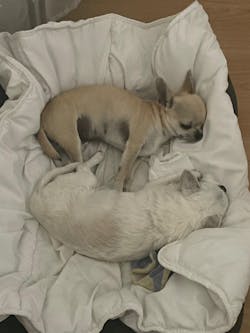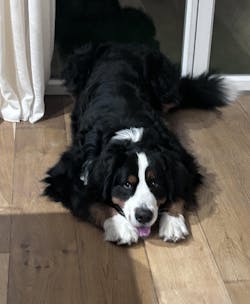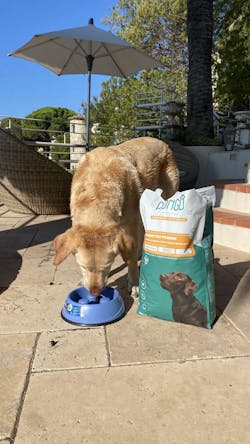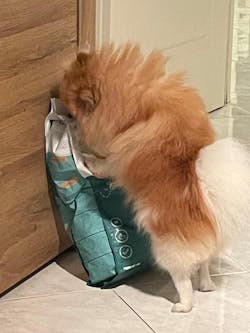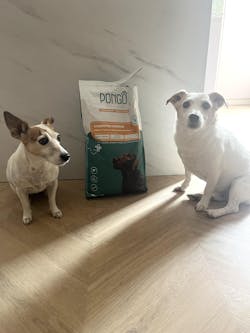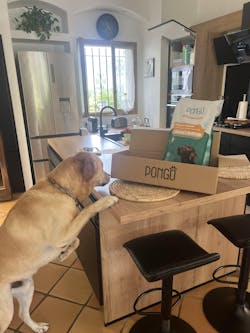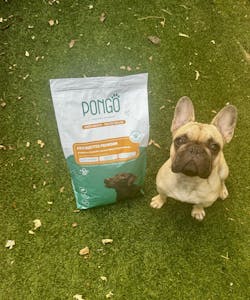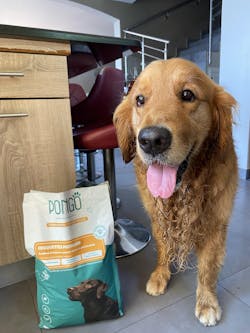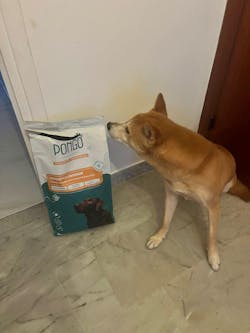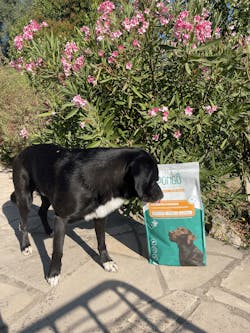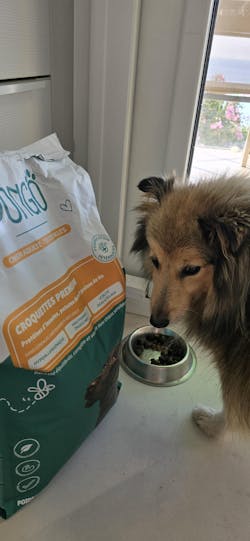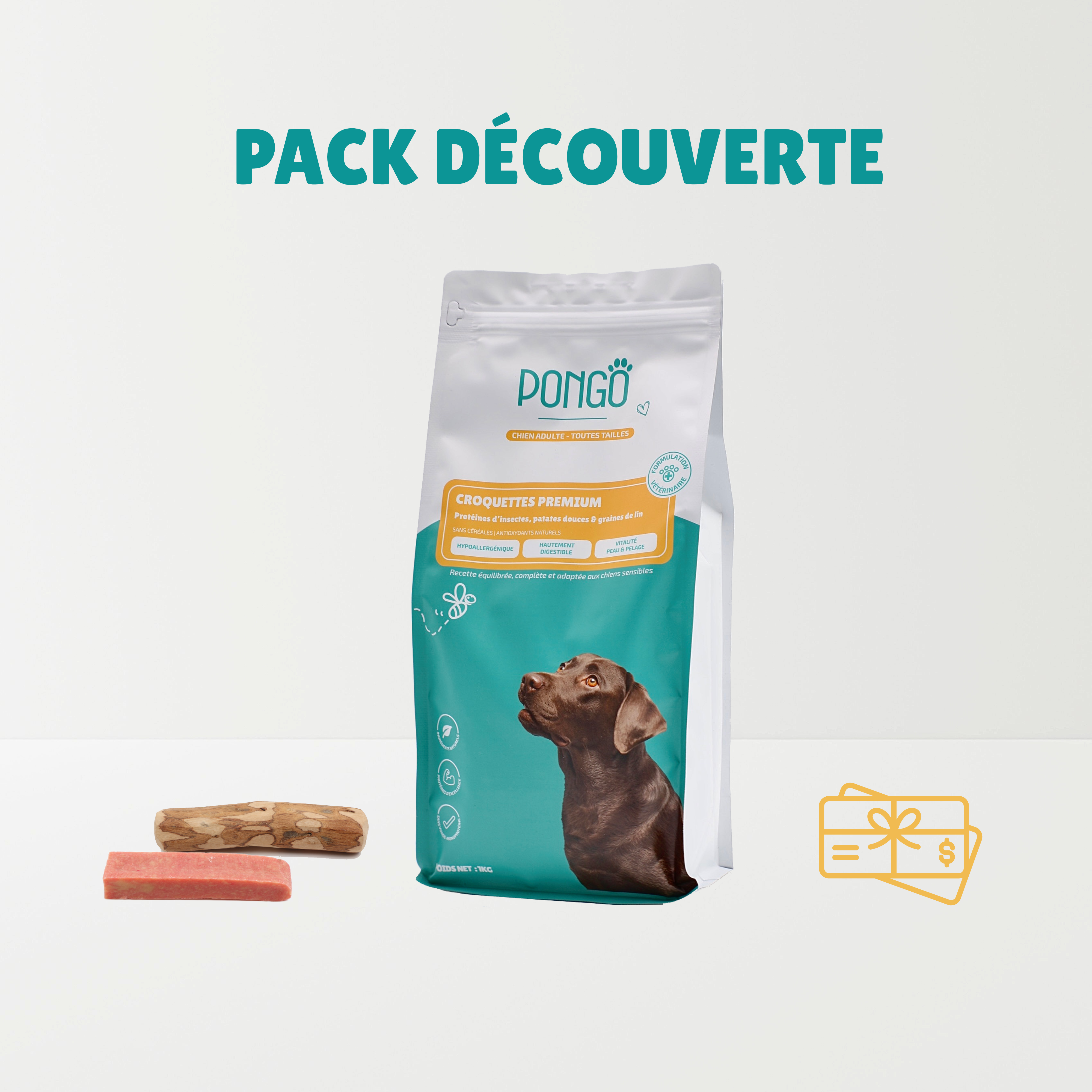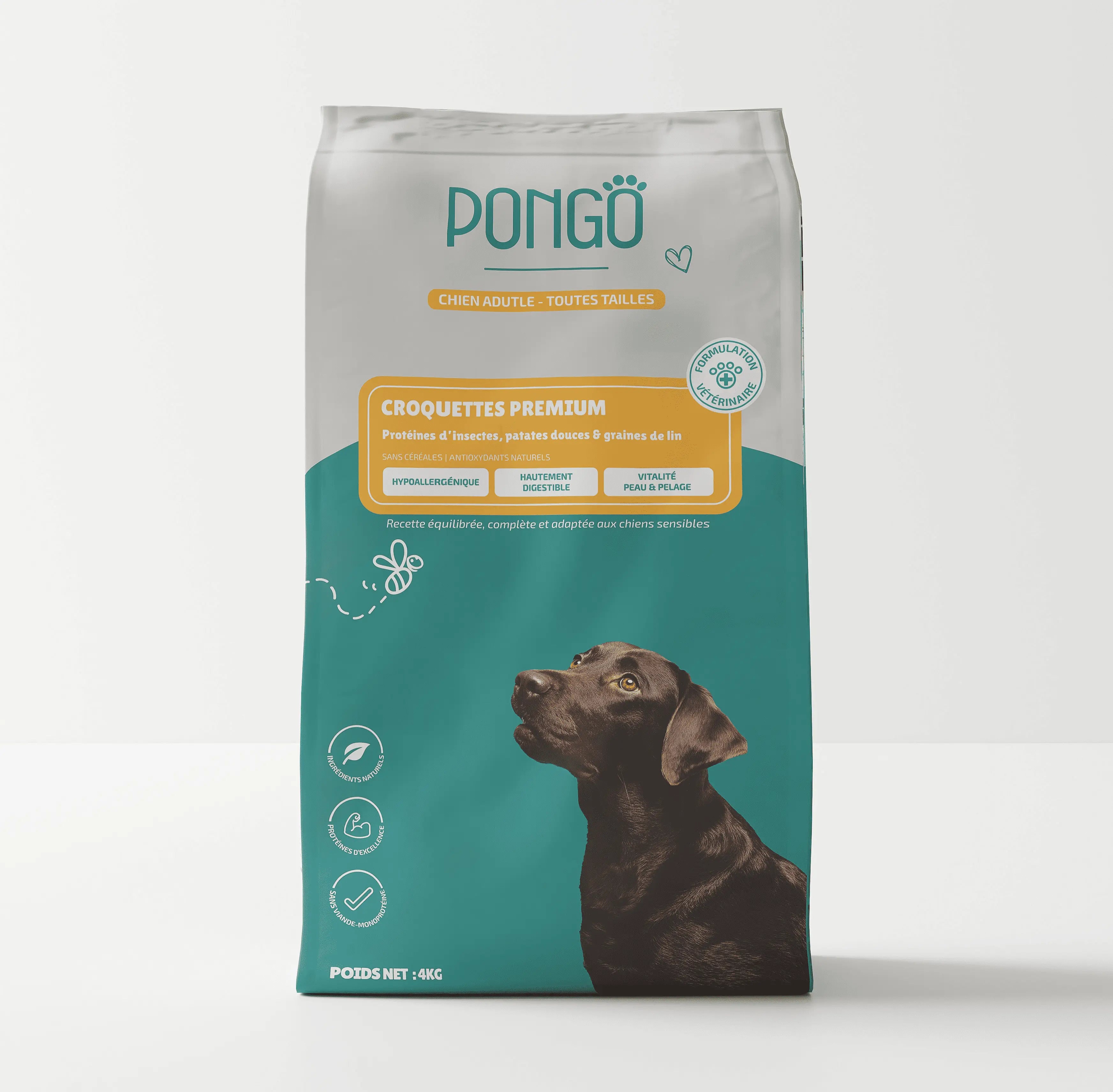Dog Diarrhea: What to Do and When to Worry
As pet parents, we all care deeply about our dog’s well-being, and seeing them suffer from diarrhea can be very concerning. When should you start to worry? How can you stop your dog’s diarrhea quickly? When is it necessary to see a veterinarian? These are all questions you may be asking yourself — and we’re here to answer them.
 Diarrhea in dogs is a common symptom and doesn’t always require concern.
Diarrhea in dogs is a common symptom and doesn’t always require concern.
Its severity can vary depending on how often it occurs and whether other symptoms are present, such as vomiting or blood in the loose stools.
That’s why it’s essential to understand the causes in order to provide the appropriate solutions and respond effectively.
How to Stop Diarrhea in Dogs? Quick Steps to Act Fast 👍
If your dog has diarrhea, don’t panic! In most cases, this digestive issue is temporary and can be managed at home. Here are the key steps to relieve your dog quickly and prevent complications.
-
Rest the digestive system
Short fasting : Fast your dog for 12 to 24 hours to allow their intestines to calm down. Make sure fresh water is always available.
Exceptions : Puppies, senior dogs, or fragile dogs should not fast too long. Consult a vet if in doubt.
-
Keep them well hydrated
Diarrhea causes loss of water and electrolytes. To avoid dehydration, offer fresh water in small amounts but frequently.
-
Reintroduce a gentle diet
After fasting, switch to an easy to digest gastrointestinal diet :
-
Well-cooked white rice
-
Small portions : feed 3 to 4 light meals per day for 2–3 days
-
Avoid dairy, fatty foods, and table scraps that may worsen diarrhea.
-
Monitor your dog’s overall condition
-
Check for blood in the stools.
-
Observe behavior: if your dog stays active and drinks normally, that’s a good sign.
-
If diarrhea lasts more than 48 hours or worsens, see a vet.
-
Avoid self-medication
Do not give human medications (like Smecta or Imodium) without veterinary advice. Some are toxic to dogs!
Specialized probiotics for dogs can help restore gut flora.
When to Worry About Diarrhea in Dogs? 😔
Diarrhea is often temporary, but some signs require urgent veterinary consultation. According to on-call vets at Toulouse Clinic, watch out for :
1. Prolonged duration: diarrhea lasting more than 48 hours despite a light diet (rice and chicken) may indicate a serious issue.
2. Blood or mucus: black, bright red, or sticky stools are warning signs of parasites, intestinal inflammation, or poisoning.
3. Associated symptoms: vomiting, fever, lethargy, or loss of appetite alongside diarrhea require immediate veterinary attention.
4. Abdominal pain: whining, hiding, or signs of abdominal discomfort (arched back) need quick examination.
5. Risk of dehydration: puppies, seniors, and small breeds dehydrate quickly. Dry gums, sunken eyes, or weakness call for urgent care.
In summary, isolated short-term diarrhea can be harmless, but with these signs, veterinary advice is essential. Recurrent diarrhea may signal an unsuitable diet. Fasting can help diagnose this. In such cases, switching to a sensitive digestion and allergen-free food is recommended.
Why Does My Dog Have Diarrhea? 🧐
Diarrhea can have many causes, from mild issues to serious illnesses. Here are common reasons:
-
Diet change
Sudden food changes disrupt digestion and cause diarrhea. Always transition gradually over several days usually 7 days or more for sensitive dogs. -
Food intolerance or allergy
Many dogs are sensitive to ingredients like gluten, chicken, beef, or fish, causing chronic diarrhea. Allergies often come with itching, redness, or hair loss. Identifying and removing allergens is key. -
Infections
Bacterial (Salmonella, E. coli), viral (parvovirus, canine coronavirus), or parasitic (giardia, intestinal worms) infections can cause diarrhea. These usually come from contaminated food, water, or contact with infected animals. Blood in stools is a red flag—consult your vet. -
Stress and anxiety
Changes like moving house, travel, renovations, or routine disruptions can trigger digestive upset and diarrhea. Reassure your dog with stable habits. Persistent issues may require veterinary or behavioral specialist advice. -
Toxic or unsuitable food ingestion
Dogs may eat toxic substances (chocolate, onions, cleaning products) or fatty table scraps that cause diarrhea. Be cautious with leftovers and toxic foods. -
Digestive sensitivity
Certain breeds (Australian Shepherd, Golden Retriever, Staffordshire Bull Terrier, Belgian Shepherd, English Cocker Spaniel, Labrador Retriever, Cavalier King Charles, German Shepherd, Miniature American Shepherd, Dachshund) are prone to digestive issues. High-quality, allergen-free proteins such as insect protein are emerging as sustainable solutions for chronic diarrhea. -
Chronic diseases
Pancreatic insufficiency, inflammatory bowel disease (IBD), or cancers can cause persistent diarrhea, often with vomiting and weight loss. -
Poisoning
Sudden severe diarrhea and vomiting may indicate poisoning—urgent vet care is needed. -
Diarrhea in puppies: a special case
Puppies have fragile digestive systems and are prone to infections and parasites. Diarrhea can quickly cause severe dehydration. Early veterinary consultation is critical.
How to Diagnose the Cause of Diarrhea? 📝
Before treating, identifying the cause is essential:
-
Observe stool consistency: liquid, mucus, or bloody stools may indicate infection or inflammation.
-
Check frequency: occasional diarrhea is less concerning; frequent, abundant stools require attention.
-
Consider other symptoms: vomiting, appetite loss, fatigue, abdominal pain help guide diagnosis.
-
Vet exams: stool tests, blood work, or abdominal ultrasound may be needed.
How to Prevent Diarrhea in Dogs? Our Practical Tips ✅
Diarrhea can often be prevented with good habits :
-
Suitable, stable diet
Choose healthy kibble with high-quality, easily digestible animal protein. Avoid allergenic ingredients.
Avoid sudden diet changes—transition over 7–10 days.
Limit table scraps, especially fatty, spicy, or dairy foods. -
Adequate hydration
Always provide fresh, clean water.
Be careful with water quality during travel (avoid stagnant or chlorinated water). -
Regular deworming and vaccinations
Deworm every 3 to 6 months depending on lifestyle.
Keep vaccines up to date to prevent viral diseases like parvovirus. -
Good hygiene
Prevent eating random things outdoors (grass, trash, other animals’ feces).
Clean food and water bowls regularly. -
Probiotics as prevention
Probiotics can strengthen gut flora, especially after antibiotics or during sensitive periods. -
Reduce stress
Stress increases risk of digestive issues. Maintain routines, offer regular exercise, and comfort your dog during changes.
Discover PONGO dog food : the solution for Sensitive Stomachs

In response to the rise of digestive issues like diarrhea and food allergies, we have developed kibble made from insect proteins specifically formulated to care for sensitive stomachs and prevent digestive troubles and food allergies. Here’s why they make a difference:
-
A hypoallergenic and easily digestible protein
-
Lower allergy risk: Insect proteins (here, the Black Soldier Fly larva Hermetia illucens) are a novel protein source, rarely found in dog food. This significantly reduces allergic reactions, which are often responsible for diarrhea and itching.
-
High digestibility: Unlike some meats or grains, insect proteins are very well assimilated, reducing the risk of intestinal fermentation and loose stools.
-
Ingredients selected for optimal digestion
-
Natural prebiotic fibers : Our kibble contains gentle fibers that promote a balanced gut flora and strengthen the digestive barrier.
-
Grain-free and allergen-free : Formulated without wheat, corn, or soy, they help avoid common intolerances in sensitive dogs.
-
Rich in anti-inflammatory nutrients
-
Natural Omega-3s (from insects and selected vegetable oils) to soothe intestinal irritation.
-
Antioxidants to support immunity and reduce chronic inflammation linked to allergies.
-
Ideal for dogs with sensitive stomachs
-
Sensitive breeds (German Shepherd, Labrador, Bulldog...)
-
Older dogs with more difficult digestion
-
Animals allergic or intolerant to common proteins (chicken, beef...)
Result: Reduced risk of diarrhea, firmer stools, and a strengthened digestive system!
How to transition to PONGO?
Mix PONGO kibble gradually with the previous food over 7 to 10 days.
Observe improvements in digestion and coat condition (less scratching if allergy-related).
Conclusion : Preventing and managing diarrhea in dogs
Dog diarrhea can be mild or a symptom of a more serious infection. Monitoring symptoms, applying initial care, and consulting a veterinarian when in doubt is important. Occasional diarrhea is common, but if recurrent, it may reveal digestive sensitivities or food allergies. In such cases, a suitable diet is essential to protect your companion.
Keys to good digestive health :
✔ Favor easily digestible proteins (like insect proteins or certain lean meats) to limit intolerances
✔ Avoid common allergens (wheat, corn, soy, some dairy products)
✔ Choose kibble rich in prebiotic fibers to support gut flora
✔ Ensure a gradual food transition when changing diets
Discover our hypoallergenic dog food
Effective against digestive disorders (diarrhea) and food allergies





